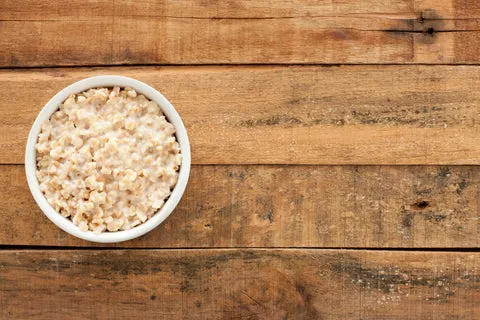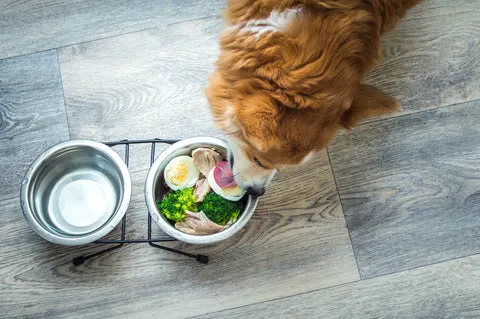When your beloved canine companion is feeling under the weather or has a sensitive stomach, their usual diet might not be the best option. Just like humans, dogs can lose their appetite or struggle to digest their regular food when they’re not feeling well. Providing soft, easily digestible foods is crucial to help them regain energy, support their recovery, and ensure they receive vital nutrients without further upsetting their digestive system.
This comprehensive guide from Dog Care Story explores a variety of soft food options that are gentle on your dog’s stomach, perfect for puppies, senior dogs, or those with dental issues. We’ll delve into ten nutritious choices to help your furry friend recover, along with considerations for dogs with chronic sensitivities or allergies. For general dietary needs, you might also be interested in what can we feed a dog.
The Benefits of Soft Foods for Dogs
Soft foods offer several advantages, especially for dogs that are sick, elderly, or have dental problems:
- Easier Digestion: Soft textures are less demanding on the digestive system, allowing nutrients to be absorbed more efficiently, which is crucial during recovery.
- Increased Hydration: Many soft foods have a higher moisture content, contributing to your dog’s hydration, which is vital when they might not be drinking enough.
- Palatability: The bland yet appealing nature of these foods can entice a sick dog to eat when they’ve lost their appetite.
- Dental Comfort: For dogs with sore gums, missing teeth, or other dental issues, soft foods are much easier to chew and swallow.
- Nutrient Delivery: Even when bland, these foods can be packed with essential vitamins, minerals, and lean protein to support healing and maintain energy levels.
If your dog’s condition persists or worsens, always consult your veterinarian for professional advice.
Top Soft Food Choices for Dogs with Upset Stomachs or Sensitivities
When your dog is sick, a plain, bland diet of nutritious foods often works best. Having these options ready can help you provide immediate care. Remember, consistency is key when introducing new foods, especially to a sensitive tummy.
1. Boiled White Meat (Chicken or Turkey)
Plain white meat, such as chicken or turkey breast, is an excellent choice for a sick dog due to its ease of digestion and low-fat content. It provides lean protein without overloading their system, helping to soothe an upset stomach. Always remove any skin or bones to prevent choking hazards and make the meat easier on their digestive system.
How to prepare:
- Rinse the meat thoroughly under cold water.
- Remove any excess fat, skin, or bones.
- Place the meat in a pot, cover it with water, bring it to a boil, then reduce the heat and simmer for 15-20 minutes until fully cooked.
- Once cooked, drain the water and cut the meat into small, bite-sized pieces for easier digestion.
- Allow it to cool before serving alone or alongside white rice or approved vegetables.
2. Plain White Rice
White rice is a staple ingredient in many bland diets for dogs and is a highly effective option when your dog has an upset stomach. While brown rice offers more nutrients, the blandness of white rice makes it a safer and easier-to-digest choice for sick dogs. Its binding properties can also help firm up loose stools if your dog is experiencing diarrhea. If your dog is underweight due to illness, supplementing with easily digestible carbohydrates like white rice can help my dog is too skinny what should i feed her.
How to cook:
- Rinse the rice under cold water.
- Add the rice to a large pan with two parts water to one part rice. Add a small pinch of salt (optional, for palatability).
- Bring to a boil, then reduce to a simmer, cover, and cook on low heat for about 18 minutes, or until all the water is absorbed.
- Allow to rest and cool; fluff with a fork, then serve.
3. Cooked Sweet Potatoes
 Sliced cooked sweet potatoes on a wooden board, ready for a dog's meal
Sliced cooked sweet potatoes on a wooden board, ready for a dog's meal
Plain, cooked sweet potatoes are rich in vitamins, including A, C, and B6, and provide ample fiber, making them incredibly gentle on the stomach. They are an excellent choice for soothing your dog’s stomach and intestines, providing essential calcium, iron, and magnesium to support their overall health. Never feed your dog raw sweet potatoes, as they are much harder to digest and could exacerbate stomach issues.
How to prepare:
- Peel the skins from the sweet potatoes.
- Chop the potatoes into chunks and add them to a pan of boiling water.
- Boil until soft, then drain and mash them thoroughly for your dog.
- Serve once cooled.
4. Pureed Pumpkin
 A Husky dog with a playful pumpkin slice smile
A Husky dog with a playful pumpkin slice smile
Similar to sweet potatoes, pumpkins are highly effective in easing an upset stomach and improving a sick dog’s well-being. They are packed with vitamins that boost the immune system and are rich in fiber, which helps regulate digestion and can alleviate both diarrhea and constipation.
You can give your dog up to four tablespoons of pureed pumpkin with their regular meal or alongside their bland chicken and rice diet. Canned pumpkin can be as effective as fresh, provided it contains no added sugars, spices, or other ingredients. Avoid pumpkin pie filling, as these seasonings can worsen your dog’s stomach issues.
5. Homemade Bone Broth
 A puppy licking bone broth from a bowl
A puppy licking bone broth from a bowl
Bone broth is a nourishing choice for sick dogs, providing essential nutrients and minerals like sodium and potassium, while also aiding hydration. It is low in carbohydrates, gentle on the stomach, and easy to digest, making it an excellent option for dogs with gastrointestinal upset. When preparing, avoid using garlic or excessive salt, as these ingredients can be detrimental to your dog’s health.
How to prepare:
- Add beef, pork marrow bones, or chicken/turkey bones to a large cooking pot.
- Cover the bones with a few inches of water and cook on low heat for 20-24 hours.
- Once finished, strain the liquid to remove all bones and solids, then allow the broth to cool before serving.
6. Stage 2 Meat-Based Baby Food
For puppies struggling with an upset stomach or adult dogs needing an extra-gentle option, stage 2 meat-based baby foods (such as plain chicken, lamb, or turkey) can be effective. Baby food is easy to chew and digest, which can be particularly helpful for dogs experiencing nausea or diarrhea. However, it is crucial to ensure that the chosen baby food contains no ingredients or additives that could be toxic to dogs, such as garlic or onion powder. Always consult your vet if you are unsure about any ingredients.
7. Poached Fish
Fish is an excellent source of healthy fats, including Omega-3 fatty acids, and essential vitamins that can significantly boost your dog’s immune system and overall health, especially when they are recovering from a stomach upset. The strong aroma of fish can also be very enticing, encouraging a dog that has lost its appetite to eat again. If your dog needs to gain weight after an illness, introducing high-quality protein from fish can be beneficial for what can a dog eat to gain weight.
How to prepare:
- The best way to prepare fish for your dog is to poach it.
- Add the fish to a pan of water, bring it to a boil, then reduce the heat and simmer for 10-15 minutes until it is fully cooked.
- Crucially, remove all bones from the fish and cut it into small pieces before feeding it to your dog.
8. Plain Cooked Oatmeal
 A bowl of plain cooked oatmeal on a rustic wooden table
A bowl of plain cooked oatmeal on a rustic wooden table
Plain, cooked oatmeal, made from rolled oats, can be very soothing for a dog’s upset stomach. It is high in soluble fiber, which can aid in relieving constipation and contains antioxidants that are beneficial for reducing stomach inflammation. While oatmeal is generally good, it’s important not to overdo it. Too much fiber can sometimes exacerbate an upset stomach, so offer it sparingly and in moderation. Ensure it’s plain, cooked with water, and free from any added sugars, milk, or flavorings.
9. Plain Yogurt
Plain, unsweetened yogurt, brimming with probiotics, is an excellent food choice for a dog with an upset stomach. These beneficial bacteria aid in digestion and support overall gut health. If your dog is experiencing constipation, plain yogurt can help regulate their digestive system and promote healthier bowel movements.
Natural, plain yogurt is readily available at most local stores. It can even be frozen and served as a cool, soothing treat on a hot day, making it a versatile option for sensitive tummies. Be mindful of which vegetables are safe to offer with yogurt, as some common human foods are toxic for dogs. For more information, read about what vegetables dogs can t eat.
10. Scrambled or Boiled Eggs
 A dog eating scrambled eggs and vegetables from its bowl
A dog eating scrambled eggs and vegetables from its bowl
As long as your dog is not actively vomiting, eggs are an ideal food choice. They are gentle on the stomach and provide an excellent source of high-quality protein. Eggs can also offer a much-needed energy boost if your dog feels a bit lethargic after an illness.
The best ways to cook eggs for your dog are scrambled without butter or oil, or simply boiled. These methods ensure they remain gentle on a sensitive digestive system. However, if your dog is vomiting, it’s best to avoid eggs completely and consult your vet.
Soft Food Options for Dogs with Chronic Sensitivities or Allergies
If your dog frequently experiences an upset stomach or recurring illness, it’s advisable to consult your vet to determine if they might be suffering from food-related or breed-specific allergies. Beyond the immediate relief provided by bland foods, certain specialized soft food options are designed for long-term management of sensitive digestive systems and allergies.
Cold Pressed Dog Food
Cold pressed dog food offers a beneficial alternative to traditional kibble, particularly for dogs with food-related allergies or sensitivities. This type of dry food undergoes minimal processing at much lower temperatures than conventional kibble, which helps retain a higher nutritional value.
Due to its gentle manufacturing process, cold pressed dog food is easily broken down in the digestive system, making it ideal for sensitive stomachs. It aids digestion and breaks down at a similar rate to raw food, meaning it can be easily integrated into a raw diet or fed alone. Many varieties are available, including grain-free options, perfect for dogs with grain allergies, providing them with nutritionally dense food that won’t upset their tummies.
Insect Protein Cold Pressed Dog Food
Insect protein cold pressed dog food is a nutritionally complete and balanced option that is gaining popularity for sensitive dogs. It is created using the same gentle cold-pressing method, preserving nutritional value and aiding digestion.
Insects offer more protein than many traditional meat sources like chicken or beef, ensuring your dog receives all essential nutrients. Furthermore, insect proteins are often hypoallergenic and low in purines, making them an ideal and innovative food source for dogs with sensitivities or meat-related allergens. Like other cold-pressed options, insect protein varieties break down easily and can be fed alone or alongside raw food.
Raw Frozen Dog Food
For dogs that are particularly fussy or highly sensitive to conventional kibble, a raw food diet can be an excellent dietary change. Raw frozen dog food is typically made from natural, minimally processed ingredients and is often grain-free, which can significantly aid digestion and improve overall health, including coat and skin condition.
Many raw food lines offer various formulations, such as mixes of meat, offal, and bone, or blends with added vitamins and minerals. These options allow you to tailor your dog’s diet precisely to their specific needs and known allergies, making it easier to manage their sensitivities. While some vegetables are good for dogs, such as cooked carrots and green beans, it’s vital to research what are good vegetables for dogs to eat before adding them to a raw diet.
Conclusion
Providing appropriate soft foods is a fundamental aspect of caring for your dog, especially when they are unwell, elderly, or have chronic sensitivities. From bland homemade options like boiled chicken and rice to specialized diets designed for allergies, understanding what soft foods your dog can eat empowers you to support their health and comfort. Always observe your dog’s response to new foods and remember that while these suggestions are generally safe and beneficial, a veterinarian’s advice is invaluable for personalized care. Always consult your veterinarian for personalized advice regarding your dog’s diet, especially if they have persistent health issues or allergies. For more insights into canine nutrition and care, explore our other articles on Dog Care Story.
